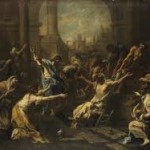Fourth Sunday in Lent – Cycle A
Reflecting on John 9: 1-41
The thing is, we know this guy. We’ve known him since he was a child. As far as anyone can remember, he was always blind― blind from birth, his parents said. Obviously, he’s a sinner. His parents, too. You don’t have a terrible affliction like blindness without a long history of sin in the family.
Moses insists we open wide our arms to the needy, so we’ve been giving him alms all these years. That’s what makes what happened today so infuriating. The sinner Jesus has been in Jerusalem with his disciples since the Feast of Tabernacles. He’s caused his usual uproar, saying outrageous things about himself, even giving some people the impression he is replacing our feasts of water and light with himself.
None of us has forgotten what he did last Passover, when he drove the money changers out of the Temple and hinted that he was going to destroy the Temple and replace it with himself! He even consorts with Samaritan women! You might have heard about that little travesty, and how she went running back to tell all the Samaritans about him. He’s obviously a sorcerer, just like they are.
And then there was the business with that woman caught in the very act of adultery. That was his chance to prove that he was a true child of Moses, but no. She walked away without a word of judgment from him. We’d already collected the stones.
Next thing you know we’ll be hearing stories of him raising people from the dead.
In the meantime, now this blind man pretends to see, and says that this Jesus cured him. And on the Sabbath! Sinners don’t cure people. Everyone knows that.
Jesus, the Messiah? No way. We just don’t see it.
What behaviors in your life do you refuse to see?






